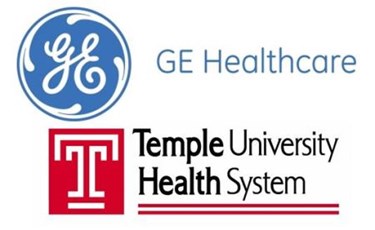GE, Temple University Health Center Ink Risk-Sharing Collaboration

GE Healthcare has signed a seven-year agreement with the Temple University Health System (TUHS) that is expected to provide the latter’s hospitals with the latest in high-quality radiologic imaging equipment, and to save TUHS over $39 million in operational costs. In the growing trend of risk-sharing collaborations among medtech companies and hospitals, GE is the first device manufacturer that has signed with an academic health system.
Last month, some of the biggest names in medtech — Medtronic, Johnson & Johnson, and St. Jude — signed deals with hospitals in which they agreed to shoulder some of the risk in using their device innovations. Experts say the trend provides financial incentive for hospitals to update their technology while giving medtech companies a chance to prove the value of their products and to improve their sales.
“It’s a big shift,” said Susan DeVore, chief executive of Premiere Inc., which represents 3,400 hospitals in contract negotiations, to Reuters. “Device manufacturers that are responding to that discussion are the most progressive ones who see the world is changing.”
This business model has proven popular among companies that develop cardiovascular implants, and it is expected to gain traction in other areas of the medical device sector that are saturated with competitive options, such as orthopedic implants. Now, GE Healthcare has entered the field with radiological equipment.
Under the terms of the agreement, TUHS will be given the opportunity to completely modernize the equipment used at Temple University Hospital’s Main, Episcopal, and Northeastern campuses, as well as at the Fox Chase Cancer Center and Jeanes Hospital. Newer innovations are expected to improve data storage methods, scheduling, and workflow efficiency, all while saving TUHS a huge piece of its operational budget over the course of the seven-year contract.
“Like many health systems throughout the country, TUHS faces clinical, operational and financial demands,” said Jeffrey Immelt, CEO of GE, in a press release. “GE is honored to work with TUHS in this strategic alliance designed to improve operational and clinical outcomes while reducing costs by $39 million.”
The Affordable Care Act (ACA) has put pressure on insurance companies to lower costs; that pressure then is passed to hospitals, which are reluctant to invest in high-quality equipment that hasn’t proven superior to existing standards.
Forbes reported that risk-sharing deals could improve the quality of patient care and patient access to the newest in device innovations.
Larry Kaiser, president, CEO, and dean of TUHS, remarked, “This collaboration [with GE] represents a new chapter in value-based healthcare contracting strategies.”
